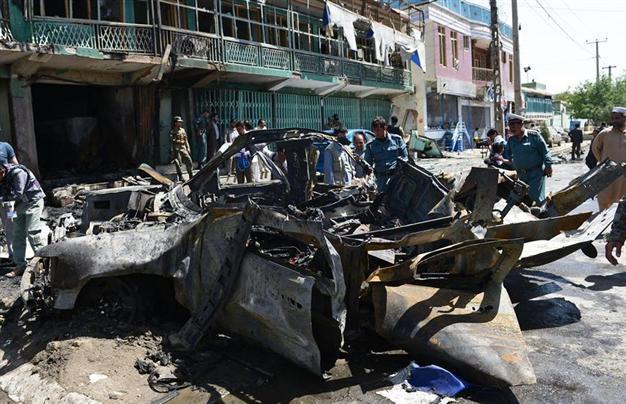Kabul suicide bombing of NATO convoy kills 15
KABUL - Agence France-Presse

Afghan policemen walk around a destroyed US military vehicle at the site of a suicide attack in Kabul on May 16, 2013. A suicide car bomb attack in Kabul on Thursday killed six civilians and wounded 37 others, the Afghan health ministry said, in an assault that targeted a foreign military convoy. AFP PHOTO/ Massoud HOSSAINI
A suicide car bomb targeted a foreign military convoy in Kabul on Thursday, killing 15 people including five Americans in the deadliest attack in the Afghan capital for nearly a year, officials said.The powerful explosion, which struck at 8:00 am (0330 GMT) in the Shah Shaheed southeastern residential district, also injured about 40 passers-by including many children going to school, officials said.
Nine Afghans including two children died, along with two US soldiers and four NATO-contracted civilians who were travelling through the city's busy rush-hour traffic.
A Western military source in Kabul said the two soldiers and three of the contractors were from the United States, without giving further details.
Hezb-i-Islami, an insurgent group that is independent from Taliban militant forces, claimed responsibility for the attack.
One NATO sports utility vehicle was completely destroyed in the blast and surrounding streets were quickly cordoned off as US troops arrived at the scene. Schoolgirls fled the area in tears as the clean-up operation began.
Thursday's bomb was the first major attack in Kabul since March 9 when a suicide bomber on a bicycle killed nine people outside the defence ministry during a visit by US Defense Secretary Chuck Hagel.
It further underlined the capital's vulnerability to militant assaults as 100,000 NATO troops gradually withdraw from Afghanistan ahead of the end of international combat operations next year.
"I was at home when I heard a terrible explosion and our whole building shook," Mustafa, a witness, told AFP.
"All our windows are shattered. I rushed outside to bring my little brothers and sisters from school. I saw five or six people covered in blood who were being taken away in police vehicles." Afghan health ministry official Sayed Kabir Amiri said local hospitals confirmed nine Afghans had died and 39 were wounded.
Two children aged six and 10 were among the dead. "Some of the bodies are badly damaged and can't be identified," Amiri added.
NATO's US-led International Security Assistance Force (ISAF) said in a statement that two soldiers and four ISAF civilians died. It declined to identify nationalities in line with coalition policy.
"Terrorists detonated an explosives-packed (Toyota) Corolla car near a convoy of foreign forces," Hashmat Stanikzai, the Kabul police spokesman, told AFP.
Police added that at least 10 houses had been severely damaged.
"Our comrades carried out this attack," Zubair Sediqi, the Hezb-i-Islami spokesman, told AFP by telephone from an undisclosed location. "Ten foreigners were killed and two of their vehicles were destroyed." Hezb-i-Islami, led by former prime minister and mujahideen leader Gulbuddin Hekmatyar, is a militant group active mainly in the east of the country rather than in the Taliban hotbeds of the south.
President Hamid Karzai condemned the bombing, while ISAF said the insurgents' claim of responsibility "proves that innocent lives are meaningless next to their own selfish aims".
The blast came weeks after the Taliban launched their annual "spring offensive" on April 27, opening a crucial period as local security forces take the lead in offensives against the insurgents.
Thursday's bombing was the deadliest attack in Kabul since June 2012 when Taliban militants killed 18 people at a lakeside hotel on the edge of the city.
All NATO combat missions will finish in Afghanistan by the end of 2014 and foreign troops have already begun to withdraw from the battlefield as Afghan police and army take over the fight against insurgents.
More than 11 years after the Taliban regime was ousted in 2001, efforts to seek a political settlement ending the violence have so far made little progress, but pressure is growing ahead of the NATO withdrawal.
















